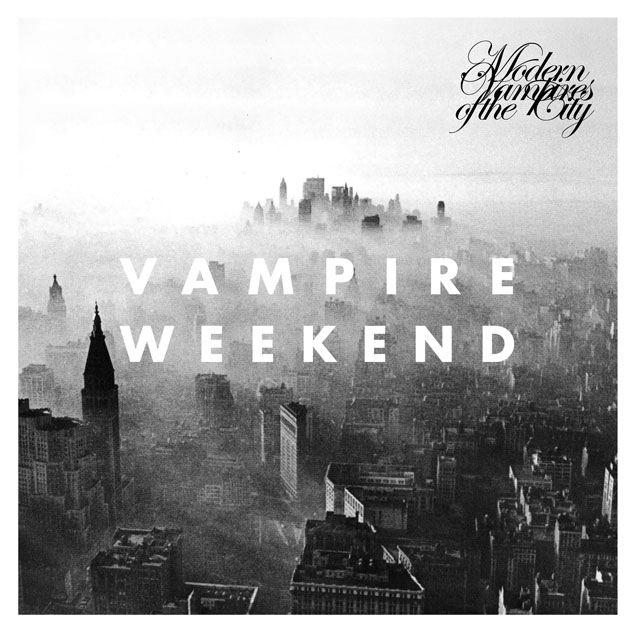Coleman Gray
When Vampire Weekend burst onto the scene in 2008 with their brilliant and eponymous debut album, and their delightful lilting that captures a crisp New England morning better than a Thoreau musing, critics hailed them as bright lights of a more defined indie rock genre. They gained renown for playing to college-educated 20-somethings who could appreciate both the simplicity and complexity of their subtle messages about life. But with that sensibility, some labeled them (and correctly so, in my opinion) as a group of privileged Ivy Leaguers who simply mused on their so-called “problems” with a childlike ignorance to actual issues outside their own white, upper middle-class bubble. Five years later, with the May 14 release of their adventurous third album “Modern Vampires of the City,” I’d say that the label has lost its stick.
Vampire Weekend’s new album does not adhere to the light, pop sentiments of their previous two albums; instead, it takes the band in a new direction, both in musicality and subject matter. Despite this experimentation, “Modern Vampires” asserts itself as the album Vampire Weekend fans (and critics alike) have longed for. This new direction is not outward, but inward—”Modern Vampires” is the first work in which Vampire Weekend becomes sentient of its position in the musical zeitgeist, while also demonstrating the doubt of modern America.
While some might classify this change as “dark,” I believe “deep” is a more apt description. Gone are the upbeat ditties about refreshing Mexican beverages and punctuation debates; more self-reflexive songs ranging from stories of depression to parodies of the pop music industry take center stage.
The opening track “Obvious Bicycle” immediately conveys this shift. Beginning with a decidedly more somber tone than the previous albums, the chorus encourages the listener to bear with this new musical style, and the more experienced feelings of the band. “Obvious Bicycle” comes across as the anti-illusionist third album equivalent of their 2008 hit “Campus.” In “Campus,” the speaker tries to woo a girl back to bed with fancy clothes and personal grooming, whereas “Obvious Bicycle” portrays a man disillusioned with the world in which “no one’s gonna spare their time” and he “must face the razor” alone.
This new, deeper sentiment permeates through the double single “Diane Young”/”Step” as well. Vampire Weekend employs a guitar riff reminiscent of punk to further emphasize their move away from everyone’s expectations. In doing so, they not only show their development, but also poke fun at the clichés of modern pop. With the self-reflective title “Diane Young” the band reiterates their outsider status by making a pun of the pop trope of dying young, and also through the use of auto-tune and incessant repetition of “baby.” However, this piece deviates from current pop music in a way that only Vampire Weekend can pull off, as it blends this blatant critique with a minimalistic, yet moving simplicity.
But the most obvious shift in musical aesthetic is prevalent in the third track, “Step.” The song begins with a tongue-in-cheek ode to the allusion-driven lyrics and sound of their previous albums; however, it soon morphs into an experimental piece about growing older and wiser while regretting the passage of time. In “Step” one can almost feel the increasing age and wisdom of Vampire Weekend, as this track demonstrates their musical departure from ‘East Coast preppy surf’ pop to a more experimental vibe, and even features a noticeable, yet oddly beautiful pitch shift in the chorus and various unconventional recording processes. With these effects, Vampire Weekend almost says, “that was who we were, but this is who we are.”
While the feeling of the album is different, the greatness of Vampire Weekend shines through. The lyrics still attract the English literature major in all of us and will send us frantically searching for the meaning behind allusions faster than a Google search. Tracks such as “Hannah Hunt,” “Ya Hey,” and “Young Lion” especially stand out among this unceasing musical wit, and are masterworks in their own right. While all these aforementioned songs are brilliant examples of music, the rest of the album is just as spectacular: a musically and emotionally seamless flow of a genre revolution.
In the chorus of the album’s second track “Unbelievers,” front man and lyricist Ezra Koenig asks, “I’m not excited, but should I be?” And “Modern Vampires of the City” answers with a resounding “yes.” For those longtime Vampire Weekend fans, this album is a revelation; it’s an unapologetic, sonic spectrum of brutal honesty. It is a departure from their music of the past, but manages to maintain the essence of the band that drew so many in. For new converts, this album will forever shift their perspective of what indie rock can be. And it is with this new understanding that one can truly experience the brilliance of Vampire Weekend, and what music can be.
Photo courtesy of vampireweekend.com












Comments are closed.